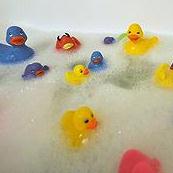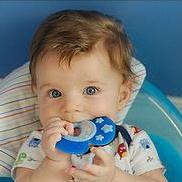 加拿大健康部部長阿格露卡(Leona Aglukkaq)於18日宣布為防止嬰幼童暴露在有毒化學物質下, 將禁用6種製造聚氯乙烯(PVC)所需的有毒化學物質。
加拿大健康部部長阿格露卡(Leona Aglukkaq)於18日宣布為防止嬰幼童暴露在有毒化學物質下, 將禁用6種製造聚氯乙烯(PVC)所需的有毒化學物質。
這份新的法規即將自6月起實施。玩具以及兒童照護用品中將禁止含有總重超過0.1%的6種增塑劑。增塑劑通常用來軟化聚氯乙烯(PVC)。
其實自從1998年以來,加拿大業界已經自發性地在兒童產品中停用了增塑劑,包括奶嘴、搖鈴、奶瓶吸嘴以及其他預期用來讓兒童與嬰兒放入口腔的產品。儘管如此,加拿大健康部在2008年進行的市場調查結果顯示,在PVC玩具以及其他幼兒產品中的增塑劑仍然廣泛存在。根據一項政府測試結果指出,有3/4(72件中的54件)的軟塑膠玩具與其他的幼兒產品含有高達39.9%的PVC成份。
加拿大健康部在政府決策文件的附加資料中指出,「增塑劑可能會造成生殖與發展的負面影響。」
阿格露卡表示,「今天我們採取行動,保障加拿大孩子們使用的玩具以及產品的安全性。新的法規將會適用於在加拿大進口,販售,或是廣告的產品。」
 加拿大健康部表示,在軟塑膠玩具中出現的少量增塑劑跟健康風險不能劃上等號,接觸或是舔舐軟塑膠玩具並不代表就有健康風險。但是年幼的兒童常會把固齒器(teething rings)以及軟塑膠玩具放到嘴巴理並且咀嚼這些物品,導致塑膠中的增塑劑釋放到他們的口水中。
加拿大健康部表示,在軟塑膠玩具中出現的少量增塑劑跟健康風險不能劃上等號,接觸或是舔舐軟塑膠玩具並不代表就有健康風險。但是年幼的兒童常會把固齒器(teething rings)以及軟塑膠玩具放到嘴巴理並且咀嚼這些物品,導致塑膠中的增塑劑釋放到他們的口水中。
加拿大健康部表示,「如果增塑劑從軟PVC中裡面溶出,那麼此時進入人體的增塑劑濃度可能造成危險。藉由持續地口腔動作如咀嚼以及吸吮,增塑劑會從塑膠中溶出,經由口水進入體內。」
在歐盟,自從1999年起,兒童玩具中一些增塑劑已經被限制到0.1%以下。在美國,一些類似的限制也在2008年消費者產品安全促進法(Consumer Product Safety Improvement Act of 2008)中實施,成為法案的一部分。
加拿大的新法規也採納了0.1%的濃度標準來限制這6種化學物質,它們分別是:鄰苯二甲酸二(2-乙基已基)酯(DEHP),鄰苯二甲酸二丁酯(DBP),鄰苯二甲酸丁酯苯甲酯(BBP),鄰苯二甲酸二異壬酯(DINP),鄰苯二甲酸二異癸酯(DIDP),以及鄰苯二甲酸二辛酯(DNOP)。
許多環境保護人士希望加拿大政府採取更多的行動,以控制增塑劑以及其他在日常生活消費者產品中出現的毒性化學物質。
20日大衛鈴木基金會(David Suzuki Foundation)以及環境婦女網絡(Reseau des femmes en environement)對政府提出一份請願書,質問為何加拿大政府沒有對例如洗髮精、乳液、止汗劑、化粧品等個人保健用品中的仿雌激素干擾荷爾蒙等化學物質執行禁令。雌激素是主要的女性荷爾蒙。
大衛鈴木基金會的研究員蓋依(Lisa Gue)指出,「加拿大的化粧品法規很明確,含有雌激素的產品不應該被允許上市。所以這些化學物質在我們的個人身體用品中做甚麼?」
這份請願書指出,雖然加拿大的化妝品法規禁止銷售任何含有「雌激素物質」的化粧品,像是對羥基苯甲酸酯類(parabens),矽氧烷(siloxanes),鄰苯二甲酸酯類(phthalates)以及BHA等都是化粧品中常見的成份。這4種物質都有證據顯示具有雌激素的活動性質,並且已經被歐盟列為疑似具有環境荷爾蒙性質的物質。
這份請願書詢問加拿大健康部將採取何種行動,對產品中含有上述以及其他仿雌激素的環境荷爾蒙物質的產製進口商進行管理。
提案中聲明,「有愈來愈多的科學證據鎖定環境荷爾蒙是對負面影響野生動物以及人體健康的元兇。」影響的範圍包括精子數減少,男性生殖器官突變或是增加癌症的機率。
蓋依表示,「內分泌干擾物現在比比皆是,我們應該降低不必要的暴露。加拿大健康部已經認可了這個方向, 我們肯定他們最近在奶瓶雙酚A與PVC塑膠玩具中增塑劑的限制。我們希望我們的提案會促進政府對化粧品中雌激素物質實施類似的法規禁令。」
※ 鈴木大衛基金會請願書:
http://www.davidsuzuki.org/media/news/downloads/2011/CESD-petition-cosmetics-2011-01-18.pdf
Canada will restrict six toxic chemicals used to soften vinyl plastics in order to limit the exposure of infants and children to the chemicals, Health Minister Leona Aglukkaq said Tuesday.
The new regulations, to be implemented in June, will ban toys and child care products that contain greater than allowable concentrations of the six phthlates, a family of chemicals used to soften polyvinyl chloride, or PVC.
"Phthalates may adversely affect reproduction and development," Health Canada said in a fact sheet accompanying the government's decision.
"Today, we are acting to make the toys and products that young Canadians use even safer," said Aglukkaq. "New regulations will ensure products that are imported, sold or advertised in Canada do not present a risk of phthalate exposure to children and infants."
The mere presence of phthalates in soft vinyl toys does not equate to a health risk, Health Canada says, adding that touching or licking soft vinyl does not constitute a health risk.
But young children often put teething rings and soft vinyl toys into their mouths and chew on them, releasing the phthalates in the soft plastic into their saliva.
"It is the amount of phthalates that leach out of the soft vinyl and migrate into the body that can be harmful," Health Canada says. "Phthalates leach out of soft vinyl during periods of sustained mouthing action (sucking and chewing) that occurs on a daily basis, and migrate into the body through the saliva."
In the European Union the concentrations of some phthalates has been restricted to 0.1 percent for use in children's toys since 1999. In the United States, a similar restriction was enacted as part of the Consumer Product Safety Improvement Act of 2008.
Canada's new regulations also use the 0.1 percent standard to limit six chemicals - di 2-ethylhexl phthalate (DEHP), dibutyl phthalate (DBP), benzyl butyl phthalate (BBP), diisononyl phthalate (DINP), diisodecyl phthalate (DIDP) and di-n-octyl phthalate (DNOP).
Since 1998, phthalates have voluntarily not been used by Canadian industry in soft vinyl pacifiers, teethers, rattles, baby bottle nipples and other products intended to be mouthed by children and infants.
Even so, Health Canada's own market survey conducted in 2008 found the widespread presence of phthalates in PVC toys and other products for young children.
According to the test results released to Postmedia News under access-to-information legislation, three-quarters (54 of 72) of soft plastic toys and other items for young children contained up to 39.9 percent by weight of PVC.
Health Canada says it conducted the tests to "understand what manufacturers are using instead of phthalates," according to an internal summary of the test results, said Sara Schmidt of Postmedia News.
Many environmentalists want the Canadian government to do a great deal more to control phthalates and other toxic chemicals in everyday consumer products.
A petition filed Thursday by the David Suzuki Foundation and Reseau des femmes en environement asks why Canada is not enforcing a prohibition on estrogen-mimicking, hormone-disrupting chemicals in personal care products like shampoos, lotions, deodorants and makeup. Estrogens are the primary female sex hormones.
"Canada's Cosmetic Regulations are clear - products that contain estrogenic substances should not be allowed on the shelf," said Lisa Gue, researcher with the David Suzuki Foundation. "So what are these chemicals doing in our body products?"
The petition points out that although Canada's Cosmetics Regulations prohibit the sale of any cosmetic that contains "an estrogenic substance," parabens, siloxanes, phthalates and BHA are common ingredients in cosmetics. All four show evidence of estrogenic activity and have been classified by the European Union as suspected endocrine-disrupting substances.
The petition asks what action Health Canada is taking against manufacturers or importers of cosmetics containing these and other estrogen-mimicking endocrine disrupters.
"There is a growing body of scientific evidence linking exposure to endocrine-disrupting chemicals and adverse effects on wildlife and human health," the petition states. These chemicals have been linked to health effects, ranging from declining sperm counts and increased incidences of male genital malformations, to increased incidences of certain types of cancer.
"Endocrine-disrupting chemicals are ubiquitous and it makes sense to minimize unnecessary exposure," said Gue. "Health Canada has acknowledged this in recent decisions to ban Bisphenol-A in baby bottles and six types of phthalates in soft vinyl toys. We hope that our petition will spur the government to start enforcing the regulatory prohibition on estrogenic substances in cosmetics."
全文及圖片詳見:ENS報導




